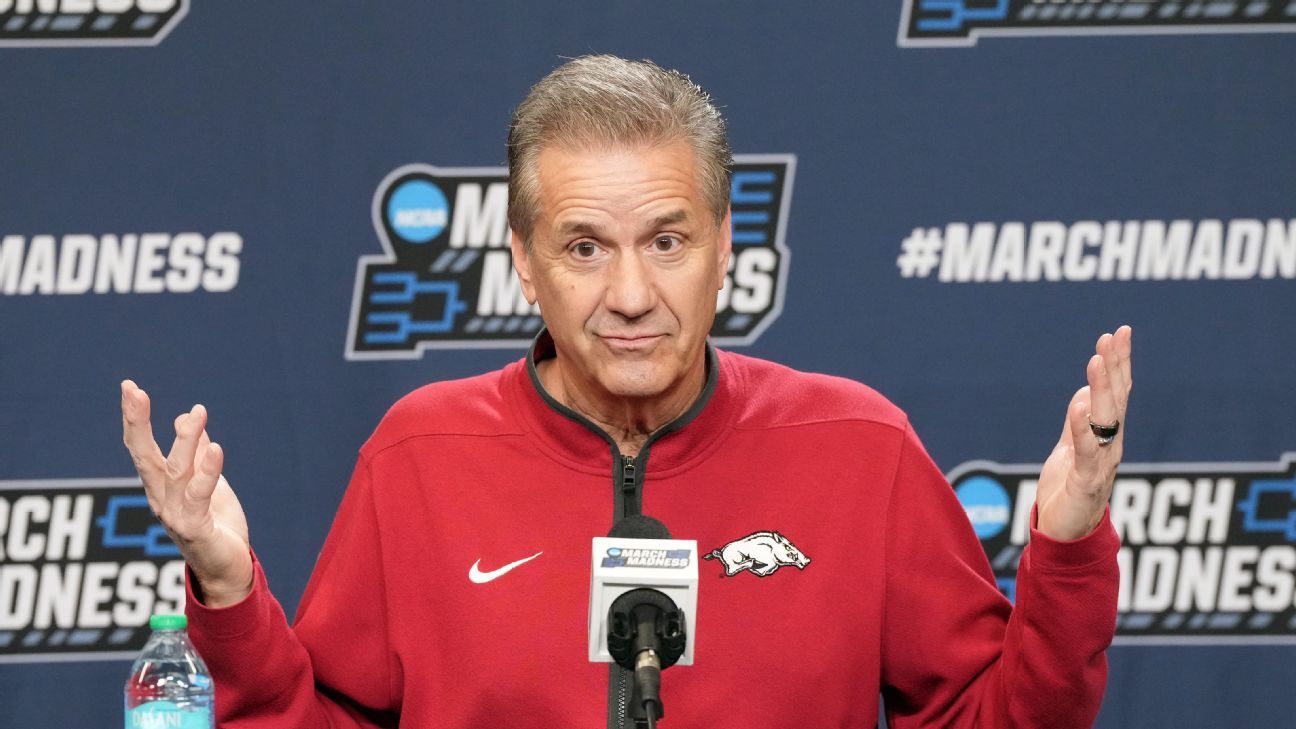
The Arkansas basketball program had just two returning players when John Calipari took over in the spring of 2024. That meant he needed to quickly build a roster -- long days of calling not only transfers and high school recruits but also boosters, businesses and the school's collective in search of money to attract said talent.
In the name, image and likeness era, fundraising is part of the life even for a Hall of Fame, national championship coach.
Two days into the job, one of the returnees, a reserve walk-on named Lawson Blake, tore an Achilles while working out. Aside from the disappointment for Blake, who would miss the entire 2024-25 season, Calipari was struck with a thought.
"What if we had just given him a million dollars and then he got injured and was lost for the season?" Calipari said. "What would the person who gave that million feel? How would you go back to that person and ask for more money?"
Paying injured players is the cost of doing business in professionalized college sports, and it was true even in the old tuition, room and board days. Under the new system, though, support can be fickle.
Just because an entity gave in one year doesn't mean it will give again. No one likes losing money.
Calipari had a term for it: "booster fatigue."
Calipari immediately sought a solution, leading to one of the more unexpected, perhaps bizarre, and yet common-sense side businesses to be hatched here in the early days of NIL and revenue sharing in college sports.
Call it "booster insurance."
Calipari spent the better part of a year discussing the issue.
It was enough to spark one of his former players at Memphis, Travis Long, along with partner Steve Stelmach, to found the 32 Group. The New York-based company works as an insurance agent, backed by Lloyd's of London, to offer this product to schools, collectives, businesses and boosters. Calipari said he has no part of the new business. He's just a customer.
For what Calipari said is 3% of an NIL/revenue share deal, 32 Group will offer insurance on the health of his Arkansas players.
For example, if a player is being paid $1 million, "Arkansas" will pay $30,000 for the insurance. If that player is lost to season-ending injury before Jan. 15, whatever entity is giving the $1 million (school, collective or business) will be paid back in full (the athlete will have already collected or will continue to get their money as spelled out in the contract). If the player goes down from Jan. 15 to Feb. 15, the policy will return 50%.
That way, should a player be lost, the school, booster or business won't feel as if their money were just torched. It will be available for use going forward on talent or funding for the next season. It's essentially a simple insurance play.
"When I first heard the idea, I couldn't believe it didn't already exist," Stelmach told ESPN. "I can't believe every university and every collective doesn't have this in place."
Stelmach estimates there is over $1 billion in direct revenue sharing among the so-called power conference teams and an additional $1 billion to $2 billion more in NIL/collective payouts. The idea that none of that was insured against injury makes sense only because this entire industry is brand new.
"We are building the bus as we are driving down the highway," Stelmach said.
Calipari said his team's boosters will be fully insured this year, and he has heard a universal response when he speaks to them about it.
"They say, 'Thank you,'" Calipari said. "They were already thinking about it. People who are rich enough to be a part of this are rich for a reason. They don't throw their money away. This is a way to protect the donor."
Calipari, 66, has always been an impatient innovator in the business of college basketball.
At UMass, he had his team play at midnight just to get on ESPN. At Memphis, he embraced the one-and-done prospect when more established coaches preached building programs through older players.
At Kentucky and Arkansas, he created made-for-TV productions and matchups, staged "pro days" for his players (and for recruits to see) and marketed his program with slogans ranging from "Refuse to Lose" to "La Familia." He never really stops.
He believes booster insurance provides a measure of respect that will keep donors coming back and investing in the team. He suspects that as the novelty of NIL wears off, raising funds will become increasingly difficult.
In 2025, if you aren't thinking about your money people, then you might be doing it all wrong. The relationship can't be just one-way.
For 32 Group, it sees a business that can expand across college sports. Stelmach said it is already in talks with a few other teams and expects the coverage to become popular as schools continue to not just scramble for every last dollar of revenue but also to consider the benefits of protecting that money.
"These are legitimate business transactions made by legitimate businesspeople," he said. "They don't walk into their businesses and it's not insured. Neither should this."
It's a new era -- with new businesses almost no one saw coming.

